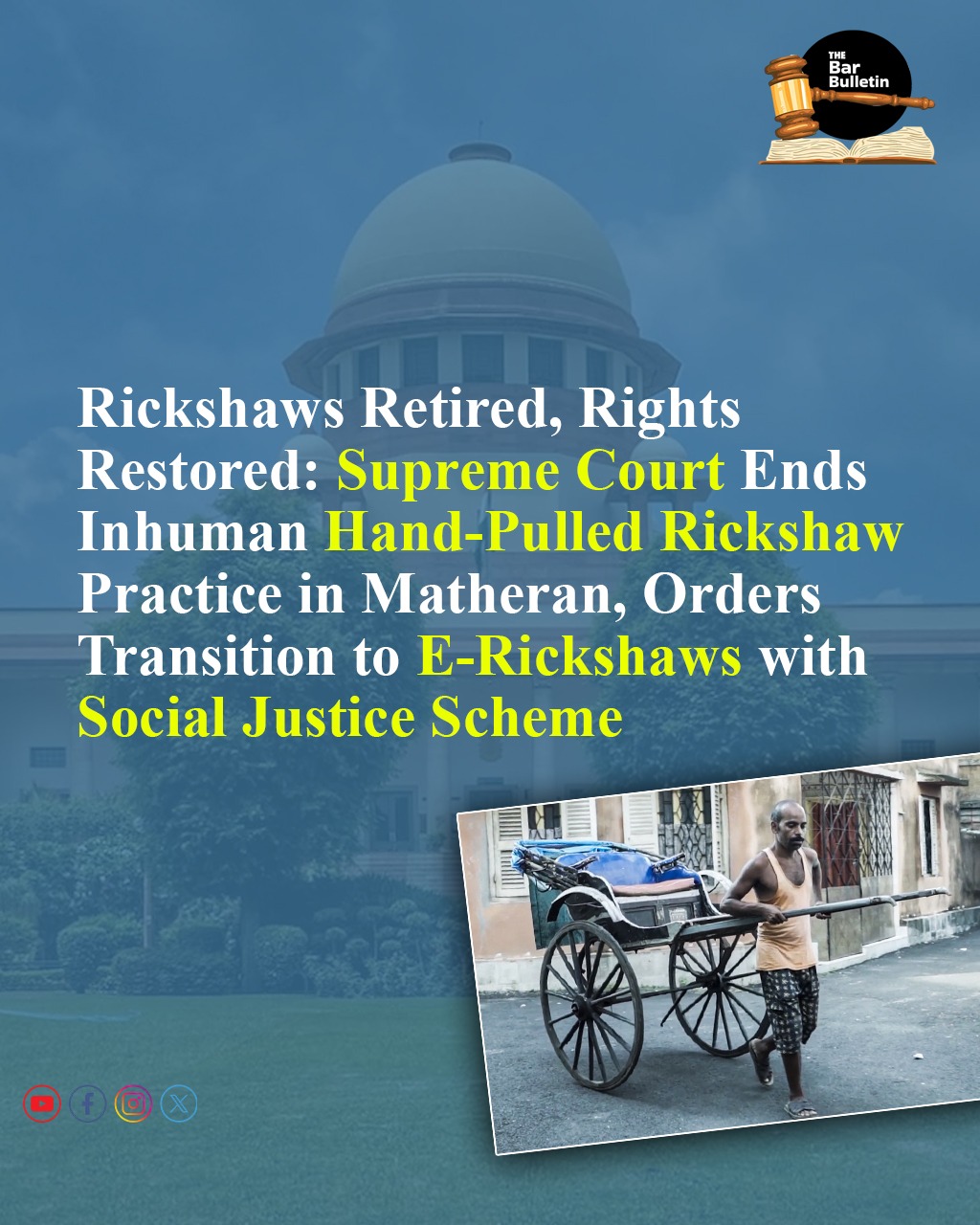The Supreme Court of India disposed of multiple pending applications, directing the State of Maharashtra to phase out hand-pulled rickshaws in Matheran, replace them with e-rickshaws, and rehabilitate the affected workers through an inclusive welfare scheme. The State was also permitted to lay clay paver blocks on the main access road, with accompanying environmental safeguards.
The current batch of petitions and applications arose out of long-standing proceedings in the TN Godavarman Thirumulpad writ petition, originally filed in 1995 for greater environmental protection, but here focused on issues facing the eco-sensitive hill station of Matheran. The main question was whether to permit clay paver blocks for soil erosion control, allow battery-operated e-rickshaws for transport, and how to transition workers engaged in hand-pulled rickshaw trade without causing hardship. The key claims related to human dignity under Article 23 (prohibition of forced labour), and achieving balance between environment, tradition, and livelihood.
Matheran’s status as an eco-sensitive zone was first buttressed by Supreme Court orders in 2001 and official notifications from the Ministry of Environment and Forests (2003), which tightly regulated vehicular movement in the town. Since then, only ambulances, fire engines, and tractors for waste were permitted, with hand-pulled rickshaws being the main form of public transport, leading to demands for reform as tourist numbers rose.
Matheran, home to roughly 4,400 residents and nearly 800,000 annual tourists, is India’s sole pedestrian-only hill station, famous for its rich biodiversity and eco-friendly mandates. The town’s iconic character depended on banning vehicles, resulting in the persistence of hand-pulled rickshaws for decades. In recent years, questions were raised about the physical toll and dignity of the labour involved, as well as environmental concerns due to rain erosion of unpaved roads heavily trafficked by horses and pedestrians. Multiple stakeholder petitions sought both soil erosion measures (such as paver blocks) and a transition to e-rickshaws.
Arguments included options like exclusive use of paver blocks made of clay not concrete, preserving trekking routes, restricting e-rickshaw numbers, and prioritizing genuine rickshaw pullers for allotment. The Amicus Curiae and several parties forcefully argued that manual human towing of carts in hilly terrain is an affront to human dignity and inconsistent with constitutional values.
The State and expert bodies from IIT Bombay, NEERI, etc. supported clay paver blocks for the main route, citing increased safety and erosion protection and recommending improved drainage and soil management.
The case was heard and decided by a Bench comprising Chief Justice B.R. Gavai, Justice K. Vinod Chandran, and Justice N.V. Anjaria. The Court allowed the laying of environmentally suitable clay paver blocks on the main road between Dasturi Naka and Shivaji Maharaj Statue, implementing all recommended drainage and erosion controls and specifically banning concrete paver blocks or beds. Internal roads and trekking routes were directed not to be paved, thereby preserving the town’s pedestrian character and supporting horse-dependent livelihoods.
Relying on landmark precedents, most notably People’s Union for Democratic Rights vs UOI[1], which consolidates Article 23’s broad prohibition of all forms of compelled or undignified labour, and Azad Rickshaw Pullers’ Union vs State of Punjab[2], which discusses social justice for manual labourers, the Court condemned the ongoing practice of human-pulled rickshaws as inhuman and unconstitutional. It noted the severe health problems and lack of real voluntariness in such labour, especially when economic duress exists.
The Court directed Maharashtra to cease the practice of hand-pulled rickshaws within six months, and to institute a rehabilitation scheme modelled on the successful Kevadia (Statue of Unity) program in Gujarat. Genuine rickshaw pullers and other underprivileged locals, especially Adivasi women, are to be specifically prioritised for training and allotment of e-rickshaws on a rental basis.
The Matheran Monitoring Committee was directed to determine eligible beneficiaries and oversee allocation based on current ground realities. The court specifically observed that funding limitations cannot be cited as a reason for delay in executing these instructions.
The bench stressed that Matheran’s status as a pedestrian hill station must be maintained, and instructed all authorities to proactively implement both environmental and social welfare directions. The judgment sets a notable precedent in combining sustainability, social justice, and constitutional dignity in urban hill governance.
Cases relied on:
1. People’s Union for Democratic Rights vs UOI, (1982) 3 SCC 235
2. Azad Rickshaw Pullers’ Union vs State of Punjab, (1980) Supp. SCC 601
Appearances:
For environment protection and horse owners: Ms. Nina Nariman, Advocate, assisted by Mr. Shyam Divan, Senior Advocate
For hand cart/rickshaw pullers: Mr. Colin Gonsalves, Senior Advocate, assisted by Mr. Vivek Vishal Gautam, Mr. Lalit Mohan, Mr. Paul Kumar Kalai
For the State of Maharashtra: Mr. Siddharth Dharmadhikari, Advocate
Amicus Curiae: Mr. K. Parameshwar, Senior Advocate, assisted by Mr. M.V. Mukunda, Ms. Kanti, Mr. Shreenivas Patil, Mr. Raji Gururaj, Mr. Veda Singh, Mr. Prasad Hegde
[1] (1982) 3 SCC 235
[2] (1980) Supp. SCC 601



